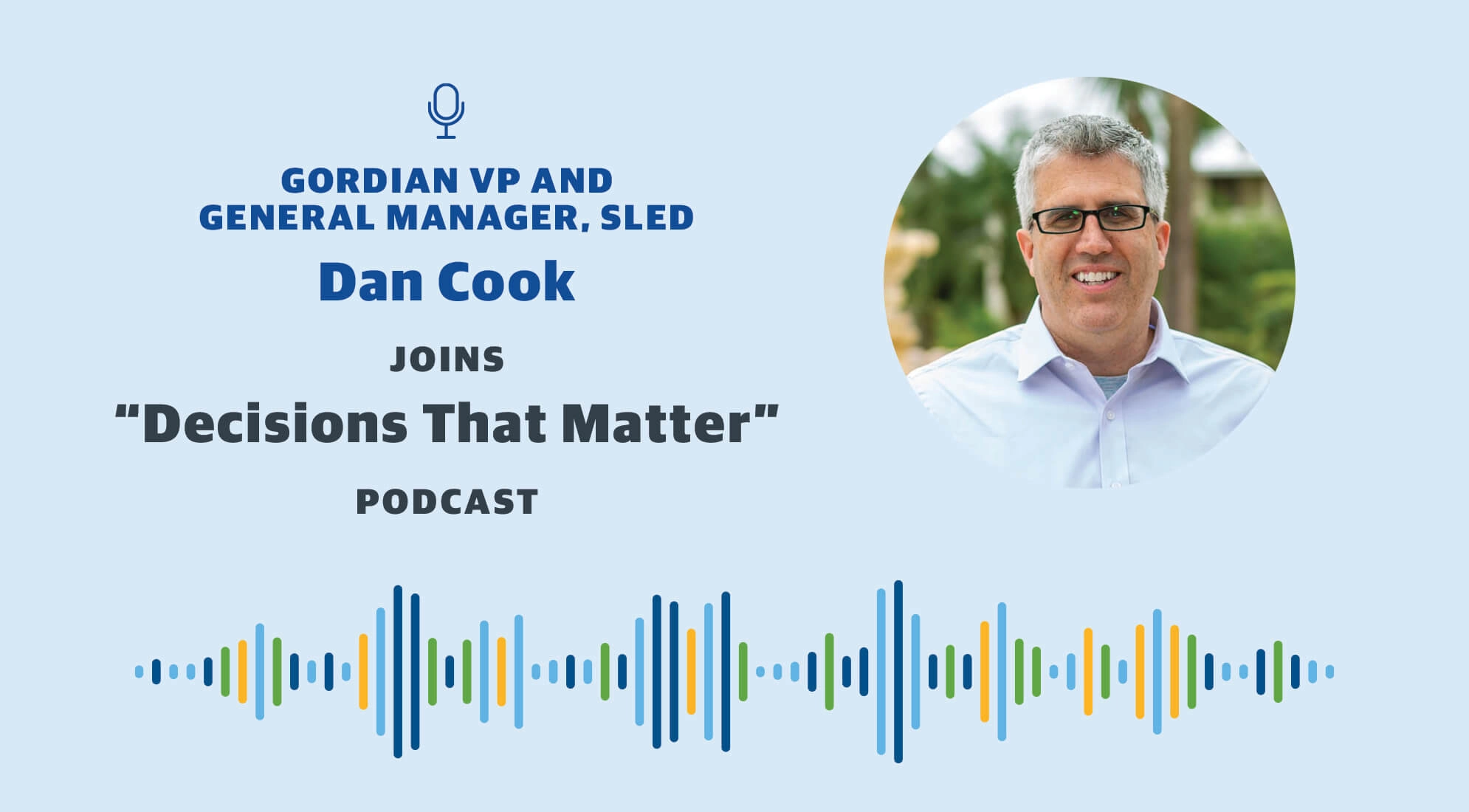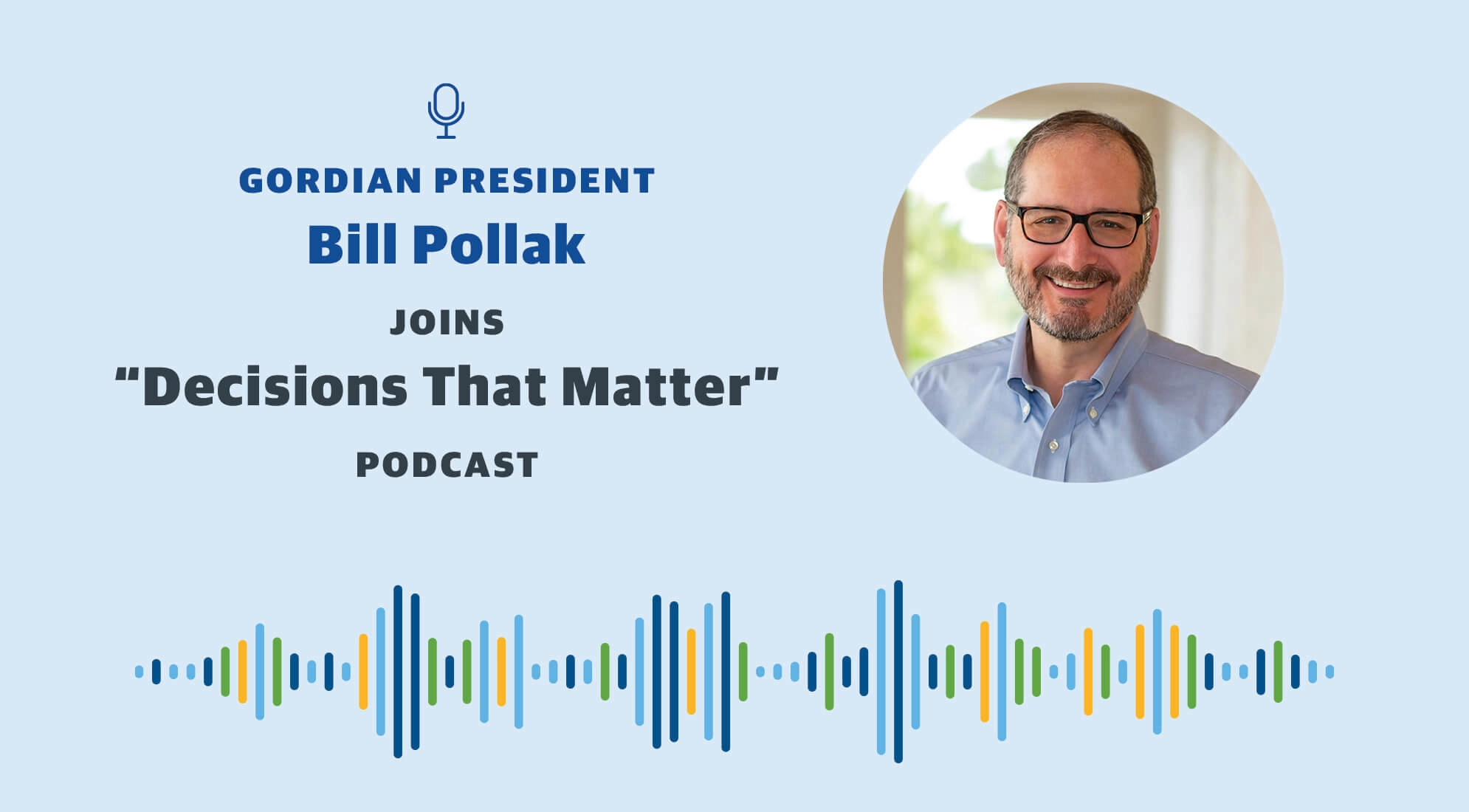
Gordian VP and General Manager of SLED Dan Cook Joins “Decisions That Matter” Podcast
March 11, 2021
Gordian Vice President and General Manager of SLED Dan Cook recently joined Procurated’s “Decisions That Matter” podcast. He discussed how Job Order Contracting (JOC) works and how it helps entities build relationships with contractors and meet their diversity/inclusion goals. Listen to the entire interview below.
Full Interview Transcript
David Yarkin, Procurated CEO and Founder: Hello. I’m here today with Dan Cook, General Manager and Vice President of State, Local and Education for Gordian. Welcome Dan.
Dan Cook: Thanks, David. Good to be here.
Yarkin: Thanks for coming. So, I’m really excited to talk with you today about Gordian, about your career, about Job Order Contracting and how that can help the procurement community. Let’s get started. Tell me a little bit about Gordian. What does Gordian do?
Cook: Gordian was started by a gentleman named Harry Mellon with the idea of bringing a procurement method called Job Order Contracting out into the public. He invented this system when he was in the military and upon retiring thought it’d be a great idea for government clients to use the same sort of procurement method.
So, he launched Gordian and we’ve been at it for over 30 years now. And we have a specialty in pre-construction activities. Planning, estimating and procurement are our three sweet spots that Gordian specializes in now.
Yarkin: And I will talk about all three of those and, and about JOC. Tell me, what do you do at, at Gordian?
Cook: My role, like you said, is General Manager over the State, Local [Government] and Education. So I oversee both the business development and the operational side of our business with our hundreds of clients across the country from California to New York. We do have a couple in Canada as well.
Yarkin: Great. So, let’s dive into this Job Order Contracting concept because I know it’s something that’s been used fairly widely within public procurement. But there are, I’m sure, some of our listeners aren’t familiar with it. So maybe give us a baseline definition of what it is and what problem it’s trying to solve.
Cook: At its core JOC or Job Order Contracting, it’s an Indefinite Quantity construction contract. So, through one competitive solicitation, you can get a series of construction projects done underneath one master contract. And the way we go about that is we assemble a catalog of preset construction prices. So it’s everything from, how much does it cost to paint a wall to put up dry wall, different types of roofings, sidewalks. So, all different types of construction tasks are given a set of predetermined unit prices. Then we put that out to bid, in the marketplace and the contracting community. That’s the basis of the competition.
Unlike a traditional bid where we exactly spell out what the Scope of Work is going to be, we don’t actually spec out individual projects. We just say, this is going to be the basis of pricing for our projects once we know what they’re going to be.
“So, if you have 50 jobs done throughout a year [with JOC], that’s 49 less times to do individual solicitation. So with that comes a lot of efficiency and cost savings in the actual procurement side.”
So, you go through one competitive bidding process but the advantage of any IDIQ-type contract is you can get a series of small projects done underneath that master contract. So, if you have 50 jobs done throughout a year [with JOC], that’s 49 less times to do individual solicitation. So with that comes a lot of efficiency and cost savings in the actual procurement side. It’s also going to give you a little bit better control over the relationship that you have with the contractors, who really have a vested interest to deliver good services because what they’re shooting for is the next job and the next job and the next job. They like to get as much work as they can underneath the contract and they know the way they do that is by making the owners happy.
Yarkin: I did an interview a few months ago with a leader from Pennsylvania who I know you’ve done some work with. And we were talking about some of the big mega trends that are going to affect the procurement industry. And it seems like from the way you talked about JOC, you know, that Gordian has a pretty good sort of way of being a resource on both of these.
So, the first one, I think we all believe that, you know, there’s probably gonna be some significant layoffs and furloughs. At least hiring freezes within the ranks of, of government and particularly in procurement. So knowing that government procurement officers are going to be very short-staffed, I believe, in the coming months and the coming years, does the JOC solution that you described here make it easier for a government to be able to get all its sort of construction and maintenance and repair jobs done? Or is that a selling point?
“[JOC] is meant to be another tool in the toolbox.”
Cook: Yeah, definitely. This is meant to be another tool in the toolbox. This is not meant to be the sole procurement source for all things construction, but for that pool of projects that it’s right for, it can reduce the number of times that procurement officer’s going to need to do a solicitation.
I know your audience is primarily procurement people, but it’s more than that, you know? Cause the shortages in the work staffs is not just going to be on the procurement side. At the end of the day, somebody needs to walk that job along with the contractor. Somebody needs to develop that scope of work. When you get into construction, somebody needs to inspect the work. And there are shortages there too. And one of the things about our model is it works well with, with flexible staffing. So, if there’s a certain influx of work that comes through, but there’s not the project managers at the clients, we can provide them.
Yarkin: I know there’s been a lot of talk about what happens in 2021 with trying to restart the economy, you know, maybe a stimulus bill, like we saw. After the great recession in 2008. How does a Job Order Contracting help a government customer when there’s a push to try and get more jobs done?
Cook: Yeah, so right, the term in 2008 — we all talked about shovel-ready projects, and the idea with any sort of Job Order Contracting or indefinite quantity contract really lends itself to that because you can have this contract already put in place.
One thing that is universal is uncertainty as to what it means for people’s budgets. A JOC contract allows for a lot of flexibility. You have these contracts, usually they have a very small minimum contract threshold, but a much larger potential maximum contract. So that allows the flexibility that if you have these contracts in place and then funding were to be there, agencies can do it and it allows them to really get projects out a lot faster by doing the procurement upfront.
Yarkin: I think a third sort of major theme and major development that I think we expect to see a lot of next year, comes out of the wake of the BLM protest that we saw throughout the country and over the summer, and a greater push, I believe, in terms of diversity, equity and inclusion in contracting as we get into the new year. How does a greater push for supplier diversity work in a JOC environment?
Cook: So what we see is on each one of the JOC contracts, I talked about it being a performance-based contract where the contractors have a vested interest in performing good, quality work.
Well, they also have interest in meeting whatever the goal is that the public agency sets up, and one of the ways that they get future work is by meeting those goals. And if they fail to deliver on any of the goals that were set in the contract, that’s a mark against them and a reason for the agencies to look to other contracting vehicles or other contractors within that.
I think we are going to hopefully see an increase in the number of agencies where that is established upfront in the contract, either in the contract award or in the evaluation process. It’s one of the things that they’re going to look hard at. How are the contractors, the general contractors that are holding the prime contract themselves, are they representing a broad span of diverse businesses? And then as they reach down into their subcontracting community, how are they doing? And are they doing the proper outreach to make sure that we get diverse businesses getting the subcontracting opportunities?
“One thing that is universal [about the future] is uncertainty as to what it means for people’s budgets. A JOC contract allows for a lot of flexibility.”
Yarkin: I always think it’s the best procurement officials that I’ve had the pleasure working with or working for over the years, are the ones who can sort of see around the corner and be able to, in some ways, read tea leaves and predict what’s going to happen in the future. And then be prepared for it, to have a kind of a game plan on how they’re going to solve the challenge. Instead of it happening, and then having a lot of meetings, try to figure it out and, on these three big topics, I think a progressive procurement official can think about them. And as I think about how they’re going to get their construction work done, Gordian seems like it’d be a really good tool in the toolbox on all three of those.
Let me dive into some questions that I had about JOC that I’ve heard from people in government through the years. One is around the definition of it. What does Gordian do, versus a general contractor? My sense is that Gordon doesn’t actually pave roads itself or do any demolition itself. Tell me about that relationship between what exactly you do versus the GC.
Cook: Yeah, the line I like to use, half joking, is we don’t do any actual work. We’re not the JOC contractors, we’re not the ones who are, who were actually performing the work. We work with the public agencies to put in place contracts. The expertise and what we bring to the table in three different buckets, it’s the data, you know, so first and foremost, like, we have construction data, like, like nobody else in the industry has. You have to have data around roadways and bridges, and then you can work for wastewater treatment plants, which are incredibly specialized construction equipment that’s going into those. And then you have schools and housing authorities, you know, housing authorities where all of a sudden you have residential grade versus commercial grade. So you really need to know what the portfolio of work is going to be so that you can customize the data and bid the contracts appropriately. So that’s really what Gordian does.
And we have a whole team of people that are constantly working behind the scenes to make sure that that data is updated and accurate to the point where it just, it would never make sense for a public agency to try to bring that expertise in house.
The second part is we have software really built for Job Order Contracting. And we also have software for planning, strategic planning. These sort of pre-construction activities.
And then we have expertise. We have people who know how to set up Job Order Contracting programs. What are best practices? How do you handle insurance? How do you handle bonding? You know, how do you handle liquidated damages?
Yarkin: One question that we hear a lot about JOC is what’s the right project size to use JOC? Is there a ceiling? Is there a floor?
Cook: So really for this one, you know, you need to look into whatever the local statutes are. There are places where there are contract limits that could be in the hundreds of thousands of dollars, to other places where it’s unlimited, and we will see multimillion dollar projects go through Job Order Contracting. We see about nationwide average project size of around a hundred thousand dollars.
But like I said, it really varies by agency on uses. If they’re using it for maintenance and operation projects, that can be much lower than that. If they’re using it for large capital construction projects, it can be much larger than that. We’ve been successful with projects that have gone out to bid, larger capital construction projects, and for whatever reason that the bids are coming in higher than the owner’s estimate. They bring those into Job Order Contracting, and we can significantly beat whatever the competitively bid price is. It’s really going to be about what’s best for the agency.
Yarkin: When you’re talking about that sweet spot, those sort of hundred thousand dollars jobs, or even smaller with, you know, really doesn’t make a lot of sense to go and do your own unique bid each time you’re doing these jobs over and over again. I’m just curious, like, have you guys ever done any analysis around sort of the time savings? When you do JOC, like how much shorter is it to do JOC than to do your own?
Cook: It’s going to depend on the agency. Like I’ve seen, some of our clients, where a bidding process can take 14 months. There are more bureaucratic agencies that we’ve worked in where their standard bidding process from the time of project conception, ‘til they actually have an awarded contract, it can be over a year. We look at our average project size, we gun for between three to five weeks.
Yarkin: When you’re talking about that sweet spot, those sort of hundred thousand dollars jobs, or even smaller with, you know, really doesn’t make a lot of sense to go and do your own unique bid each time you’re doing these jobs over and over again. I’m just curious, like, have you guys ever done any analysis around sort of the time savings? When you do JOC, like how much shorter is it to do JOC than to do your own?
Cook: It’s going to depend on the agency. Like I’ve seen, some of our clients, where a bidding process can take 14 months. There are more bureaucratic agencies that we’ve worked in where their standard bidding process from the time of project conception, ‘til they actually have an awarded contract, it can be over a year. We look at our average project size, we gun for between three to five weeks.
Yarkin: There’s so many benefits as you were talking about them to JOC: from time-savings, getting projects done faster, less reliance on existing staff, diversity, holding suppliers accountable. If you had to pick one, this maybe like picking your favorite child, but if you had to pick one, which of those sort of resonates the most to you and to your customers?
Cook: When it’s working well, I think the partnering relationship, the removal, you know, going back to when Harry invented this, one of his real goals was to cut down on the adversarial relationship that happens in construction between the contractor and the owner.
And so when you see Job Order Contracting working well, and you see a public agency able to reach out to a contractor for help, because that’s what they’re doing, and develop that Scope of Work together, to work through that scope, to work through the budget to come to an agreement.
I think that is the part that excites me the most is when you see what can at times be a very contentious adversarial relationship become a partnering relationship that, you know, it’s a cliche, but it really becomes a win-win for all parties.
The contractor is successful. They’re able to get the work done, which is what they want to do, at a fair and reasonable price. And the public agency is able to do that at a fair and reasonable price in a shorter period of time. I think that’s the part that really excites me more than anything is that sort of partnership that can come on a Job Order Contracting.
Yarkin: If you think back on your long career at Gordian, is there sort of a project that stands out to you as particularly significant and impactful, maybe where that partnership really, um, played out to the fullest?
Cook: There’s a couple of clients that are always meaningful to me. Housing authorities in general, because at the end, these are people’s homes, right? There’s nothing more personal than that. Simple things like park benches outside of housing authorities become really meaningful to people because it’s their homes. When you can turn units over and a fresh coat of paint and renovate somebody’s kitchens. Those are personal. So, I think those are ones. And I think the same would be true of schools. Anytime you can renovate a school and then you can see the principal and the teachers’ reactions to a nicely renovated classroom. Like just the joy that that can bring. Those are really meaningful things, good to be a part of.
Yarkin: Sounds like the mission is a big part of the company.
Cook: Yeah. I mean, it’s fun, you know. I went into construction because I like to see things get built. And the fact that it gets built in the public sector, primarily, and these are things that people get great use out of and enjoy in little small doses, we’re not building a sports stadium or giant hotel resorts, but these are little things that get used every day. And that’s very meaningful.
“A lot of agencies are doing Job Order Contracting, so it’s not seen as new. It’s proven.”
Yarkin: Have you seen the company and JOC evolved a lot over the time, has it been fairly consistent?
Cook: I think the core tenets of JOC haven’t changed much. Our data’s gotten much more robust and better. And JOC, when I started with Gordian was seen as a, it was new and experimental and would get lumped into sort of the cutting edge. But I think now everybody understands the value of having some sort of IDIQ contract. A lot of agencies are doing Job Order Contracting, so it’s not seen as new. It’s proven.
Yarkin: What do you recommend is the best way to get started with JOC?
Cook: We have a lot of information on our website. So you can go to gordian.com and look for some of the information there. There’s some good explainer videos that talk a little bit more detailed about how we implement Job Order Contracting.
You can see some case studies of some of these agencies that have used Job Order Contracting successfully. And then if it sounds like something that could work for the agency, just fill out the contact information there. And we’d love to talk about Job Order Contracting or any of our other solutions with any sort of public agency out there
Yarkin: Do you want to talk for a minute about the other offerings that the Gordian has beyond Job Order Contracting?
Cook: Yeah, Gordian purchased RSMeans [data] jeez now six, seven years ago. RSMeans [data] has been around for a long time and it’s really the industry leader in construction data and estimating. It’s the primary tool that engineers use for estimating construction data. So, there’s a natural alignment there between what we do in construction cost data.
And then we also have a side of the business that focuses around planning. These are not just FCAs or Facility Conditions Assessments. It’s really about taking the data that can come out of the facilities assessments and helping put together a strategic plan. IDIQ Contracts like JOC are great because it allows agencies to do any sort of project that comes up. But what’s even better is when you actually plan out the work. We find that’s a problem where a lot of agencies can fall down if they might have these type of contracts, but there’s not a lot of strategic thought as to like, all right, How do we do this?
Typically, when you look at what the backlog of projects are, it’s usually significantly larger than whatever the annual budget is. So, you’re going to have to prioritize on projects. You also need to know when emergency projects come up then you need to bump something off the list. How are you going to prioritize to do it? So we have a lot of focus on that. Like I said, that sort of pre-construction is what we sort of see our core competencies are.
Yarkin: Alright, good. Good. Well, Dan, thanks so much for joining us today and for really helping us understand the ins and outs of Job Order Contracting and Gordian. I really appreciate your time. Look forward to hearing about more successes down the road.
Cook: It’s great talking with you. Thanks.
Share this:





